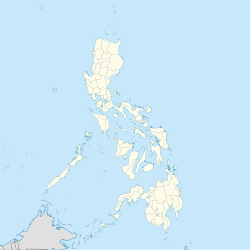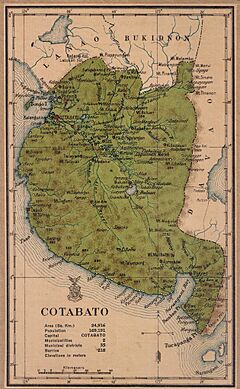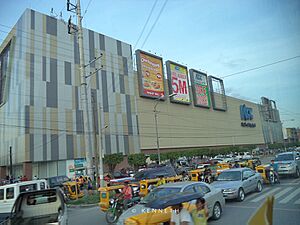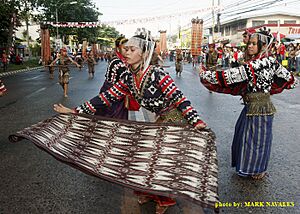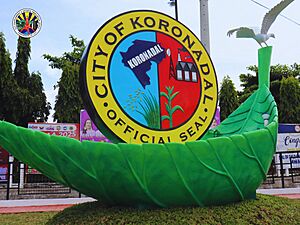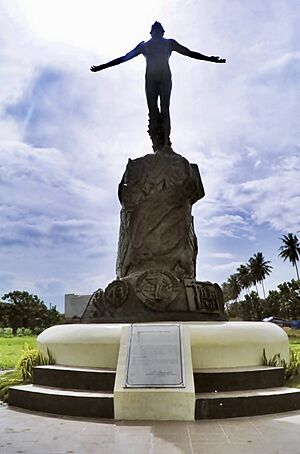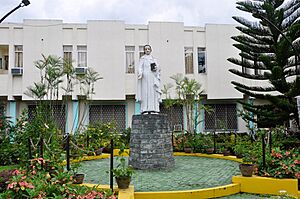Koronadal facts for kids
Quick facts for kids
Koronadal
Marbel
|
|||
|---|---|---|---|
|
Component city
|
|||
| City of Koronadal | |||
|
Koronadal Poblacion Roundabout (top), City Hall (bottom)
|
|||
|
|||
Nickname(s):
|
|||
| Motto(s):
Bagong Koronadal... Ngayon at Bukas!
|
|||
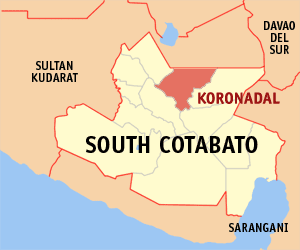
Map of South Cotabato with Koronadal highlighted
|
|||
|
OpenStreetMap
|
|||
| Country | Philippines | ||
| Region | Soccsksargen | ||
| Province | South Cotabato | ||
| District | [[{{#property:P7938}} | — Lua error in Module:Wd at line 1804: attempt to index field 'wikibase' (a nil value).]] | ||
| Founded | January 10, 1939 (as Marbel Settlement District) |
||
| Chartered | August 18, 1947 | ||
| Cityhood | October 8, 2000 | ||
| Barangays | 27 (see Barangays) | ||
| Government
|
|||
| • Type | Sangguniang Panlungsod | ||
| Area | |||
| • Total | 277.00 km2 (106.95 sq mi) | ||
| Elevation | 333 m (1,093 ft) | ||
| Highest elevation | 2,271 m (7,451 ft) | ||
| Lowest elevation | 7 m (23 ft) | ||
| Population
(2020 census)
|
|||
| • Total | 195,398 | ||
| • Density | 705.408/km2 (1,827.00/sq mi) | ||
| • Households | 50,814 | ||
| Demonym(s) | Koronadaleños; Marbeleños | ||
| Economy | |||
| • Income class | 1st city income class | ||
| • Poverty incidence |
|
||
| • Revenue | ₱ 1,618 million (2022) | ||
| • Assets | ₱ 3,139 million (2022) | ||
| • Expenditure | ₱ 1,271 million (2022) | ||
| • Liabilities | ₱ 496.2 million (2022) | ||
| Service provider | |||
| • Electricity | South Cotabato 1 Electric Cooperative (SOCOTECO 1) | ||
| Time zone | UTC+8 (PST) | ||
| ZIP code |
9506
|
||
| PSGC |
[https://psa.gov.ph/classification/psgc/?q=psgc/barangays/{{#pro000®code={{&provcode=
|
||
| IDD : area code | +63 (0)83 | ||
| Native languages | Hiligaynon Cebuano Maguindanao Blaan Tagalog |
||
| Website | koronadal |
||
Koronadal, also known as Marbel, is an important city in the Philippines. It is the capital of South Cotabato province. Koronadal also serves as the main administrative center for the Soccsksargen region (Region XII).
With a population of about 195,398 people (as of 2020), it is the second largest city in its region. Koronadal is special because most of its people speak Hiligaynon. The city has been recognized as a "Most Competitive City" and a "most business friendly city" in Mindanao.
Contents
What's in a Name?
The name Koronadal comes from the Blaan words kolon (meaning "cogon grass") and datal (meaning "plain"). This describes the area well. The city's other name, Marbel, comes from the Blaan term marb el, which means "murky waters." This refers to the nearby Marbel River.
A Look at Koronadal's Past
The area of Koronadal was first home to the Blaan and Maguindanao tribes. Long ago, Koronadal covered a very large area. It stretched from Buluan Lake in the north to Polonoling in Tupi, South Cotabato in the south. It also went from the Quezon mountain range to T'boli, South Cotabato in the southeast.
On August 18, 1947, President Manuel Roxas officially created the municipality of Marbel. The local government started working on January 1, 1948. At that time, Marbel included many areas that are now separate towns. These include Banga, Lake Sebu, Norala, Santo Niño, Surallah, T'Boli, Tampakan, and Tupi. It also included Isulan in Sultan Kudarat.
Koronadal became the capital of South Cotabato province on July 18, 1966. The city celebrates its founding every year on January 10.
Becoming a City
Koronadal officially became a city on October 8, 2000. This happened when Republic Act No. 8803 was approved.
Today, Koronadal is a quickly growing city. It has twenty-seven barangays, including four zones in the main town area (población). As the capital of South Cotabato, it is the center for politics, culture, and business.
On March 30, 2004, President Gloria Macapagal Arroyo declared Koronadal as the new regional center for Soccsksargen. This meant many government offices moved there from Cotabato City.
Where is Koronadal?
Koronadal is in the northeastern part of South Cotabato province. It is located between 6°24' to 6°34' north latitude and 124°47' to 124°58' east longitude. To the north, it borders Lutayan, Sultan Kudarat. To the northwest is Tantangan. Columbio, Sultan Kudarat, is to the northeast.
To the south, Koronadal borders Tupi. To the southwest is Banga, and to the southeast is Tampakan. The city's land is mostly flat or gently sloping. About half of its area is flat. The Roxas and Quezon mountain ranges are nearby, with peaks up to 800 meters high.
Barangays: City Neighborhoods
Koronadal City is divided into 27 smaller areas called Barangays. Each barangay has smaller parts called Puroks and some have Sitios.
The Philippine Statistics Authority says that 17 of these barangays are considered Urban. The rest are Rural.
- Assumption (Bulol)
- Avanceña (Barrio III)
- Cacub
- Caloocan
- Carpenter Hill
- Concepcion (Barrio VI)
- Esperanza
- General Paulino Santos (Barrio I)
- Mabini
- Magsaysay
- Mambucal
- Morales
- Namnama
- New Pangasinan (Barrio IV)
- Paraiso
- Rotonda
- San Isidro
- San Roque
- San Jose (Barrio V)
- Santa Cruz
- Santo Niño (Barrio II)
- Saravia (Barrio VIII)
- Topland (Barrio VII / Zulueta)
- Zone I (Poblacion)
- Zone II (Poblacion)
- Zone III (Poblacion)
- Zone IV (Poblacion)
Koronadal's Weather
| Climate data for Koronadal City, South Cotabato | |||||||||||||
|---|---|---|---|---|---|---|---|---|---|---|---|---|---|
| Month | Jan | Feb | Mar | Apr | May | Jun | Jul | Aug | Sep | Oct | Nov | Dec | Year |
| Mean daily maximum °C (°F) | 31 (88) |
31 (88) |
32 (90) |
32 (90) |
31 (88) |
30 (86) |
29 (84) |
30 (86) |
30 (86) |
30 (86) |
30 (86) |
31 (88) |
31 (87) |
| Mean daily minimum °C (°F) | 23 (73) |
23 (73) |
23 (73) |
24 (75) |
24 (75) |
24 (75) |
24 (75) |
24 (75) |
24 (75) |
24 (75) |
24 (75) |
23 (73) |
24 (74) |
| Average precipitation mm (inches) | 64 (2.5) |
45 (1.8) |
59 (2.3) |
71 (2.8) |
140 (5.5) |
179 (7.0) |
192 (7.6) |
198 (7.8) |
163 (6.4) |
147 (5.8) |
113 (4.4) |
66 (2.6) |
1,437 (56.5) |
| Average rainy days | 12.2 | 10.3 | 12.7 | 15.7 | 26.0 | 27.4 | 28.1 | 28.2 | 26.0 | 26.7 | 22.9 | 16.6 | 252.8 |
| Source: Meteoblue (modeled/calculated data, not measured locally) | |||||||||||||
Koronadal has a mild, sub-tropical climate. It belongs to climate Type IV. This means it is usually free from typhoons. The rainy season runs from June to October.
People of Koronadal
Who Lives Here?
Most people in Koronadal are descendants of Hiligaynon migrants. These migrants came from Panay and Negros Occidental. However, many other groups also live in the city. These include Cebuanos, Ilocanos, and Pangasinans. There are also Bicolanos, Kapampangans, Tagalogs, and Warays. This mix of cultures makes Koronadal a "melting pot."
The first people in the city were the native B'laans and T'bolis. There were also Maguindanaons. These groups are now minorities but are still important parts of the city.
Languages Spoken
The main language in Koronadal is Hiligaynon. This is why the city is called "the Ilonggo Capital of Mindanao." Other languages like Tagalog, Ilocano, and Cebuano are also widely spoken. English is also used. The native languages Blaan and T'boli are spoken by their respective ethnic groups.
Religious Beliefs
Koronadal is home to people of many different faiths.
Catholicism
Roman Catholicism is the largest religion in Koronadal. The city is part of the Diocese of Marbel. This diocese serves over 1.67 million Catholics. Koronadal has several Catholic churches, including the Christ the King Cathedral.
Islam
Islam is the second largest religion in the city. It is mainly practiced by Muslim communities. These communities have roots among the Maguindanaon and Iranun people. The city has several mosques, including the Koronadal Grand Mosque.
Other Christian Faiths
Many people in Koronadal belong to other Christian groups. These include:
- Iglesia ni Cristo
- Seventh-day Adventist Church
- Southern Baptist Convention (SBC)
- Evangelical Christian fellowships
- The Church of Jesus Christ of Latter-day Saints (LDS)
- Members Church of God International (Ang Dating Daan)
These groups have many churches and congregations throughout the city.
Native Religions
Koronadal is part of the traditional lands of indigenous peoples like the B'laan and T'boli. While many have adopted Christianity or Islam, some still follow traditional animist beliefs. They often practice these alongside their main religions.
Economy and Business
| Source: Philippine Statistics Authority |
|
Koronadal is a busy center for shopping and business.
Shopping and Commerce
The city has several large shopping malls. These include Mall of Ace Centerpoint, Gaisano Grand Koronadal, CityMall Koronadal, and KCC Mall of Marbel. These malls are major shopping spots. They help boost the city's tourism and economy.
Koronadal also has many smaller, local shops. This makes it the main shopping hub for South Cotabato and nearby areas. More big companies like Robinsons Group, SM Prime, and Puregold Price Club, Inc. are planning to open stores here. This will make Koronadal even more important for shopping.
City Government
Koronadal became a city on October 8, 2000. Since then, the City Government of Koronadal has been in charge of its political leadership. It also works to improve the city's culture and economy. The local government has started many programs. These programs aim to improve public services, roads, education, and healthcare. They also work to attract more businesses. This helps Koronadal grow as a key city in the Soccsksargen region.
The current Mayor is Eliordo Ogena. The Vice Mayor is Erlinda P. Araquil.
Culture and Traditions
Koronadal is rich in culture, influenced by its diverse people.
B'laan Culture
The B'laan people are one of the native groups in Mindanao. They consider the Maguindanao tribe as brothers and sisters. Long ago, Islam came to Southern Mindanao through a marriage between an Arab man and a B'laan woman. This is why the Spanish efforts to spread Catholicism were not successful in the south.
The B'laan and Maguindanao became trade partners. The B'laans lived in the mountains, growing rice, vegetables, and raising livestock. The Maguindanao lived along the coast. The original religion of the B'laan people is Animist.
Maguindanaon Culture
The region's diverse culture comes from many people moving here. This started during the American colonial period and continued later. There are three main cultural groups. First, the early Filipinos from various native tribes in the highlands. Second, the Maguindanaons, who were early followers of Islam. They see this region as their traditional home. Third, the Catholic Filipinos who settled here from other parts of the country.
Catholic Christian Culture
Catholic Filipinos make up most of the population in the Southern Philippines. They are relatively new to the area. The first Christian migrants came in the 1600s. The Spanish encouraged people from Luzon and Visayas to settle in places like Zamboanga and Cotabato.
The Americans continued this trend. In 1913, the American government helped set up farming communities in Mindanao. Many migrants came to the region, especially Hiligaynons, Cebuanos, and Ilocanos. These people helped clear land and develop farming and industries.
City Events
Koronadal has hosted big events. These include the Pyesta Kalon Datal: Koronadal International Folkloric Festival in 2015 and 2018. It also hosted national events like the Palarong Pambansa in 1996 and 2007. On June 12, 2009, President Gloria Macapagal Arroyo celebrated Independence Day in the city. This was a very important event for Koronadal.
Festivals to Enjoy
- Hinugyaw Festival (January 8–10) – This festival celebrates the founding of Koronadal as a municipality. It features street dancing and lively night parties.
- T'nalak Festival (July 16–18) – This festival honors South Cotabato's Tboli tribe. It showcases colorful abaca cloth woven by the women of their tribe. The festival symbolizes the unity of different ethnic groups. There is a parade with floats and cheer dance competitions. People wear native costumes of the Blaan, Tboli, and other tribes.
- Cityhood Charter Anniversary (October 8) – This day celebrates Koronadal becoming a city. It includes the "Negosyo Festival," which highlights the city's strong businesses. Shoppers can enjoy a month-long sale with big discounts. October 8, 2024, was declared a special non-working day for the city's 24th Charter anniversary.
Places to Visit
Museums
- Historical Marker of the Seventeen Martyrs
- Notre Dame of Marbel University Library and Museum
- South Cotabato Community Museum
- Tantoco Memorial Showcase
Parks
- B'lok Creek Esplanade
- Bong Gumne de Muhon
- CIOFF Park
- Damweng Dmatal
- Freedom Park
- General Paulino Santos Roundball
- Paraiso Verde Water Park
- Rizal Park
Resorts
- El Gawel Zoo
- Mambucal Hot Spring
Shrines
- Albert Morrow and Santiago Odi Memorial Shrine
- Filipino – Japanese Memorial Shrine
Waterfalls
- Saravia Falls
- Siok Falls
- Supon Falls
Healthcare Services
Koronadal is a main healthcare center for its region. It has many facilities to provide health services to everyone. The City Health Office offers various essential health services. Besides hospitals and clinics, the city has many laboratories for important tests. Koronadal is also home to the Department of Health (DOH) Center for Health Development Soccsksargen. This makes it a key regional hub for healthcare.
Major hospitals in Koronadal City include:
| HOSPITAL | LOCATION | BARANGAY |
|---|---|---|
| Allah Valley Medical Specialists' Center | General Paulino Santos Drive | Barangay Zone III Poblacion |
| City of Koronadal - Manuel C. Callejo Memorial Hospital | Santo Niño - San Jose Road | Barangay Rotonda |
| Dr. Arturo P. Pingoy Medical Center | General Paulino Santos Drive | Barangay Zone IV Poblacion |
| Socomedics Medical Center | Judge Alba Street | Barangay Zone III Poblacion |
| South Cotabato Provincial Hospital | Emilio Aguinaldo Street | Barangay Zone III Poblacion |
Education in Koronadal
Education is easy to access in Koronadal. The city has many schools at all levels. These include public and private primary, elementary, and secondary schools.
The City Schools Division of Koronadal manages public schools. It is part of the Department of Education (DepEd) Region XII. This division makes sure that all public schools offer good education. They follow the national K to 12 curriculum.
The division manages over 40 elementary schools and 8 public high schools. These are organized into six school districts. They serve thousands of students in both city and rural areas. The division also takes part in national education programs.
Some notable public high schools are:
- Koronadal National Comprehensive High School
- Esperanza National High School
- Marbel 7 National High School
- Concepcion National High School
Besides public schools, Koronadal has private schools and special science schools. The Philippine Science High School – SOCCSKSARGEN Region Campus is one example. It is for students who are very good at science and math.
The City Schools Division Office works with the local government. They support school buildings, teacher training, and student well-being.
Schools for All Ages
Here are some well-known schools in the city:
- Dolores Peneza Montessori Academy Inc.
- King's College of Marbel, Inc.
- Koronadal National Comprehensive High School
- Koronadal Southern Elementary School (Chinese School)
- Maryland School
- Marymount School
- Notre Dame - Siena School of Marbel
- Notre Dame of Marbel University - Integrated Basic Education Department
- Notre Dame of San Jose
- Philippine Science High School – SOCCSKSARGEN Region Campus
- St Alexius College - Integrated School Department
Colleges and Universities
Koronadal has two universities:
- Notre Dame of Marbel University
- University of the Philippines Manila - School of Health Sciences – Koronadal City Campus
Many other colleges also offer higher education. Here are some of them:
- ACLC College of Marbel
- Goldenstate College – Marbel
- Green Valley College Foundation Incorporated
- King's College of Marbel, Inc.
- Korbel College
- Marbel Institute of Technology College
- Marvelous College of Technology, Inc.
- Ramon Magsaysay Memorial Colleges – Marbel
- Regency Polytechnic College
- St. Alexius College
- SITE Dizon
- STI College – Koronadal
- SouthPhil Institute of Technology, Inc.
Seminaries
Koronadal is also home to two seminaries. These are the Our Lady of Perpetual Help Seminary (OLPHS) and the Saint Gabriel College Seminary. The Passionist Fathers run the Saint Gabriel College Seminary.
Getting Around Koronadal
Land Travel
Public Transportation
The most common way to get around the city is by tricycle. In 2021, tricycle routes were divided into four main clusters:
- Red cluster – Serves Northern Barangays like Avanceña and parts of General Paulino Santos.
- Yellow cluster – Serves Eastern Barangays like Cacub, Esperanza, and New Pangasinan.
- Green cluster – Serves Southern Barangays like Assumption, Carpenter Hill, and Santa Cruz.
- Blue cluster – Serves Western Barangays like Morales and Paraiso.
The city government also launched 10 new routes in 2022. This is part of the Public Utility Vehicle Modernization Program. Some routes are already active, like Saravia to Downtown and San Isidro loop.
Future Railway
Koronadal will have a train station for the Mindanao Railway Phase Two. This railway will connect Digos and Koronadal, passing through General Santos.
Air Travel
The closest airport to Koronadal City is the General Santos International Airport in General Santos. Other airports that can be used are Francisco Bangoy International Airport in Davao City and the Cotabato Airport in Cotabato City.
Sea Travel
The nearest seaport for Koronadal is the Makar Wharf in General Santos. Another option is the Sasa Port in Davao City.
Famous People from Koronadal
- Christian Perez - a darts player
- Jason Sabio - a footballer who plays for Kaya
- Kenneth Duremdes - a PBA basketball player
- Ernestine Tiamzon - a DLSU Lady Spiker
- Lovely Abella - a GMA artist
- Orlando Quevedo - a cardinal of the Roman Catholic church. He was the Archbishop Emeritus of Cotabato. He grew up in Koronadal.
Sister Cities
Koronadal has special connections with other cities, called "sister cities."
- Cotabato City
- Ozamiz
- Pagadian
See also
 In Spanish: Koronadal para niños
In Spanish: Koronadal para niños
 | Dorothy Vaughan |
 | Charles Henry Turner |
 | Hildrus Poindexter |
 | Henry Cecil McBay |






